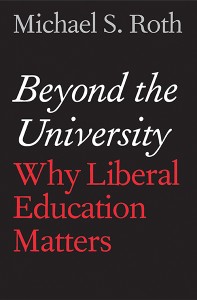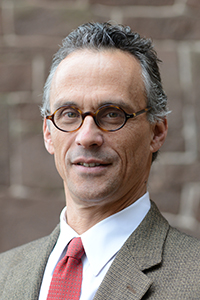President Roth Charts the Development of Pragmatic Liberal Education in His New Book

The broad contextual education that Wesleyan and peer institutions offer is frequently critiqued, sometimes excoriated, by those who accuse it of not preparing graduates for success in today’s world. But that accusation, says President Michael S. Roth in his sixth and latest book, Beyond the University: Why Liberal Education Matters (Yale University Press, 2014), is as old as liberal education itself – and never less convincing than now.
A historian whose previous scholarship has focused on making sense of the past, Roth charts the development of pragmatic liberal education through a succession of important American thinkers. Liberal education has deep roots in American culture and society, he says, as does the tension between liberal education and vocational education.
“The commitment to liberal learning that Jefferson described has been attacked for its potential elitism and irrelevance for more than two hundred years,” he writes. Jefferson saw education as both a key preparation for citizenship, essential for the health of the republic, and a means for fighting abuses of wealth and privilege. As the founder of the University of Virginia, he stressed that students would have the freedom there to pursue study that they found meaningful, not prescribed coursework.
“In the last few years,” Roth continues, “commentators (who usually themselves have had a liberal education) have again questioned whether we should encourage so many people to have the opportunity to make this discovery.
“If higher education is conceived only as a job-placement program for positions with which we are already familiar, then liberal learning does not make much sense. But if higher education is to be an intellectual and experiential adventure and not a bureaucratic assignment of skill capacity, if it is to prize free inquiry rather than training for ‘the specific vocations to which [students] are destined,’ then we must resist the call to limit access to it or to diminish its scope.”
Roth draws on prominent proponents of pragmatism such as John Dewey, but his research also led him to less known figures, such as David Walker, a free black shopkeeper from Boston who applied the Jeffersonian understanding of education to blacks, and thereby frightened many people who believed (rightly) that blacks who got an education would not be content to spend their lives in service to whites. W.E.B. Dubois later became a strong advocate for that position, contending that while blacks might need skills, they also needed a broad contextual education to realize their full human potential.

Roth was also drawn to Jane Addams, who contended that education could activate the sympathetic imagination and lead one to be more engaged with the world. Her view, he notes, underlies discussions held in recent years at Wesleyan about how to connect scholarship to action in the world – which led to the development of the Patricelli Center for Social Entrepreneurship.
As much as he decries demands for narrow vocationalism, Roth also has no patience for the trope of sophistication favored by some of the highly educated. He cites Franklin, who poked fun at the kind of education that is a mask for snobbism – “learning to exit a drawing room properly” – and in an interview about the book noted a similar pretense on campuses today where it’s all too cool to be ironic and show how smart you are by diminishing others. “At Wesleyan,” he said, “I have tried to steer the energies of challenge and protest toward curricular work where students will think about how their own beliefs can be translated into not just showing how someone else is wrong, but showing how they might act on those beliefs in ways that make a positive difference.”
Roth believes there has been a healthy tension between liberal and vocational teaching in America, which gives liberal education here a different context from its European counterpart – less bound to specific disciplines, more a mode of thinking. Today, pragmatic liberal education, in his view, enhances the ability of students to live meaningful lives and respond innovatively to new challenges such as those posed by seismic technological change.
“Liberal education,” he writes at the end of the book, “matters far beyond the university because it increases our capacity to understand the world, contribute to it, and reshape ourselves.”

